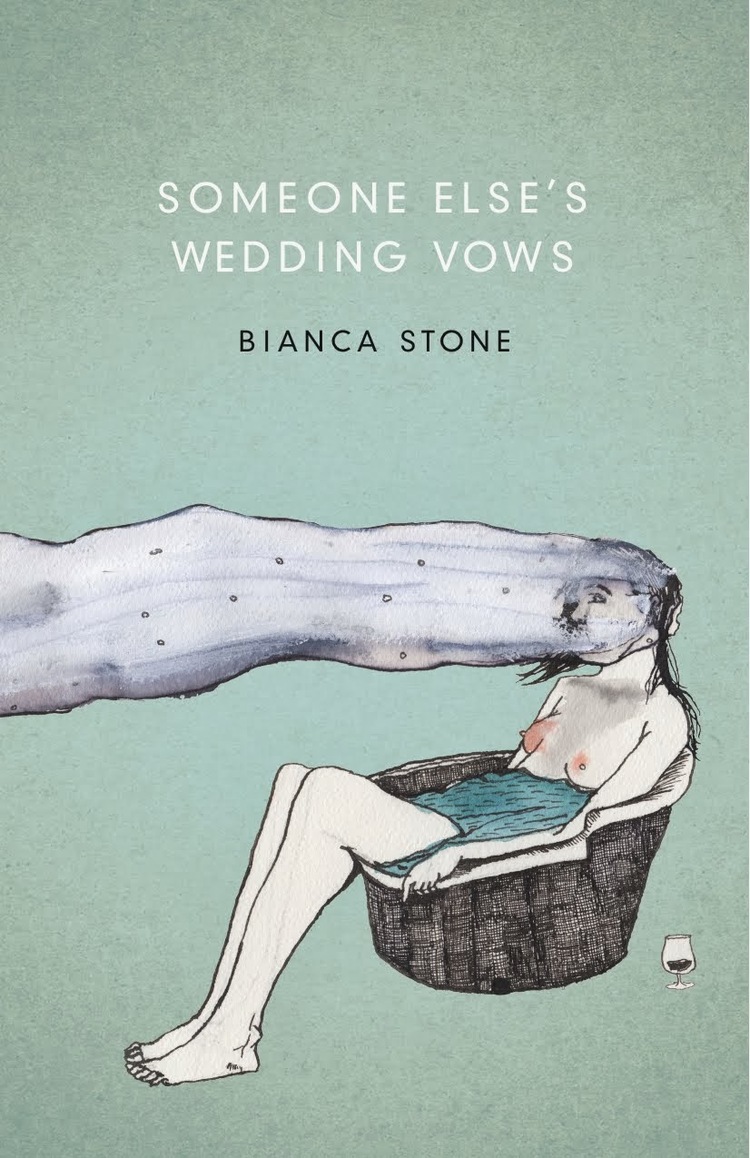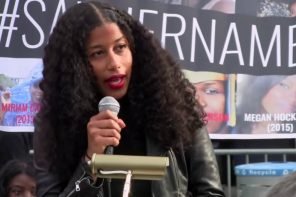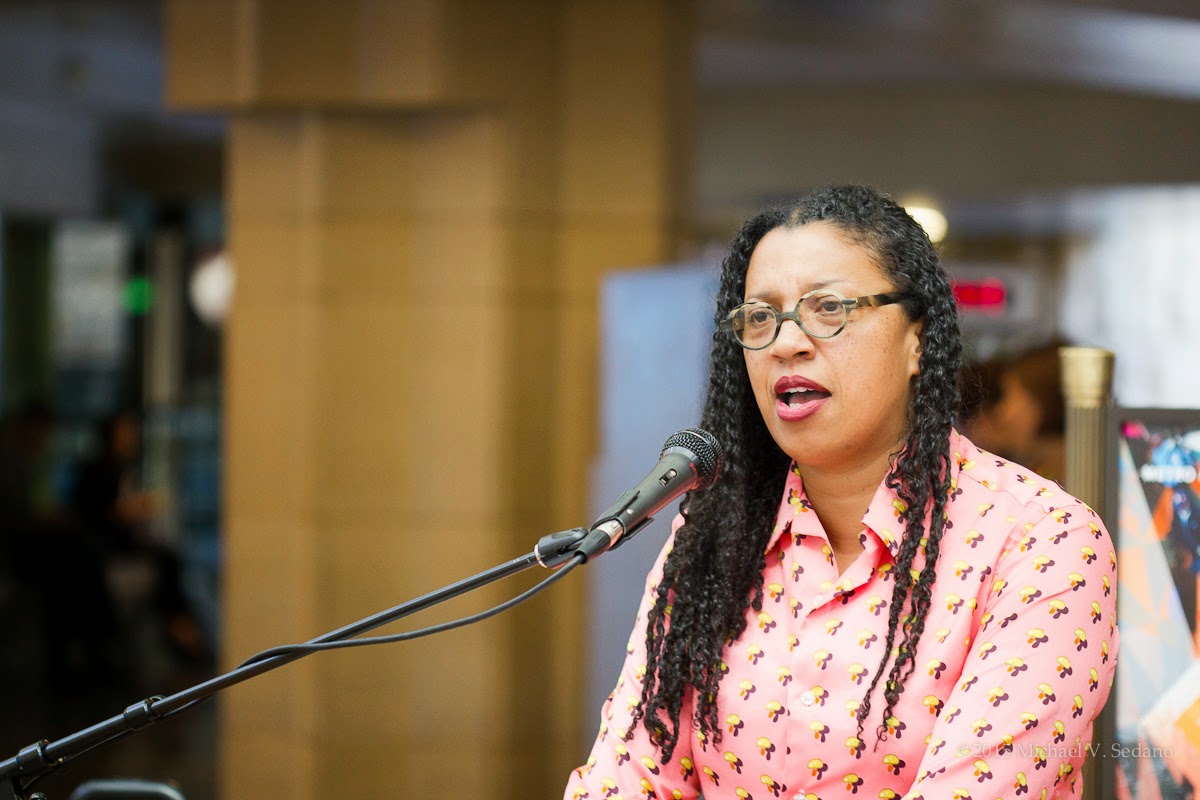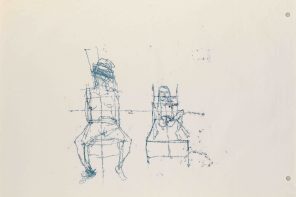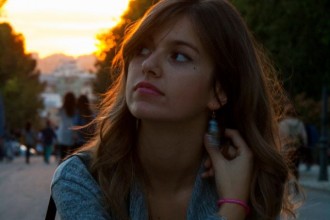Bianca Stone es poeta y artista visual. Es autora de varios chapbooks como I Saw The Devil With His Needlework (Argos Books) y de los poetry cómics I Want To Open The Mouth God Gave You, Beautiful Mutant (Factory Hollow Press). Su primer libro es Someone Else´s Wedding Vows, al que pertenecen los poemas que traduce hoy para La tribu de Frida Juan Fernández Rivero.
También es editora de Monk Books, una pequeña imprenta que publica ediciones limitadas de chapbooks de poesía y arte. Sus poemas han aparecido en Best American Poetry 2011, Conduit, Crazyhorse and Tin House.
Stone ha colaborado con Anne Carson ilustrando una traducción que Carson hizo de Antígona (Antigonick, 2012). Vive en Brooklyn con su novio, el poeta Ben Pease y su gato. Es nieta de la poeta Ruth Stone.

La poeta Bianca Stone.
Tú, porque amas, te derrumbas
Hoy tienes el pelo precioso.
Esto es una caricia microscópica en una fiesta.
Es el desvanecerse de los muertos.
Es llegar a casa
con tu corazón de gorila en completo desorden.
Es sentirse como un barco de vapor
meciéndose en el muelle a medianoche,
un merendero soportando
el viento. Pero es también la vida levantada
por tus manos torpes,
tu cerebro que se enciende
cuando ves una mujer hermosa
comiendo frutos secos en la oscuridad de un bar.
Tienes la cabeza dividida en dos por un arroyo;
cada hemisferio, embrujado y divino,
viene de tus profundidades (aquel asunto tuyo,
la voz de tu dolor, tus dibujos animados).
Los padres locos y ausentes
engordan una hoguera
con sus ventosidades,
y tu pesado cuerpo se levanta y marcha.
Se trata de empezar una frase diciendo
nunca le he contado esto a nadie.
Y tú estás, hambrienta y espantosa,
al borde de la tierra,
donde aguardan los muertos,
y donde ellos, en el bullicio
de un vórtice de colchas y raíces,
escuchan todavía;
quieren que se los ame,
quieren que se los recuerde de manera adecuada.
Somos nosotros mismos los que nos llevamos hasta el río
y nos alimentamos de café y de explosiones de opiáceos
propagados por el aire.
Se trata de polvo de hueso, un puñado de menta,
las obras reunidas de Dante
que lo cubren todo de madera castaña.
Es la imagen nítida
de alguien detrás de ti, que se parece a ti
pero que puede hacer que las moscas se le posen en los dedos.
Es el nervio óptico
reflejando sin fin a tus amigos.
Es tus amigos preparándote una tarta inmensa
rellena de higos y de mirlos,
trazando halos con las manos
y hablando honestamente,
poniéndose sensibles.
Es salir del bar con ellos.
En el taxi, de camino a casa, os acostáis los unos
en los brazos de los otros.
Because you love you come apart. Your hair is wonderful today./ This is a microscopic/ caress at a party./ This is the dead fathoming./ This is coming home/ with your gorilla heart all disordered./ This is feeling like a steamboat/ swaying at the wharf at midnight./ A picnic bench weathering/ in wind. But this is also your life made/ with your clumsy hands–/ your brain lighting up/ when you see a beautiful woman/ eating french-fries in a dark bar./ Your head is split down the middle by a brook;/ Each hemisphere, divine, witchy,/ Out of the depths–your trouble,/ your grief speaking, your cartoons./ The crazy, absent fathers/ all breaking wind in a fire/ and the fire engorged./ And your heavy body is getting up and going./ This is starting a sentence with/ I´ve never told anyone this./ And you are gruesome, hungry/ at the edge of the earth/ where the dead wait it out./ From a bable in the ground/ in a vortex of quilts and roots:/ they are still listening./ They want to be loved./ They want to be remembered corretly./ We brign ourselves to the river/ and we feed ourselves coffee and blasts of airbone opiates./ This is bone-dust. A fistful of mint./ The collected writings of Dante/ that cover everything in a brunette wood./ There is the clear image/ of someone beside you who/ looks like you/ but can get bluebottle flies to land on her finger./ This is the optic nerve/ in endless reflections of your friends./ This is your friends making you a massive cake/ filled with blackbirds and figs,/ making halos with their hands,/ saying loyal things/ and getting emotional./ This is leaving a bar with them./ In the cab home you lay in each other´s arms.
Ha llegado el futuro
El ser humano empieza a arder a una cierta temperatura,
pero yo siempre ardí ligeramente más despacio.
Cuando iba al colegio,
dejaba un rastro de pisadas ennegrecidas
de camino hacia la clase de gramática, en la que nunca destaqué.
Cuando se acabe la tierra
nos encerrarán en nuestros fallos gramaticales,
los brazos alrededor de las rodillas de nuestras madres
para que no se vayan, las cabezas llenas de cerveza, la luz
retrocediendo. ¿Cómo será la muerte reservada para mí?
El soldadito de plástico verde le está apuntando a todo con su rifle.
¿Pero qué se hace con un arma en realidad?
En toda mi vida solo he tocado tres
y la tercera que empuñé fue la única que he usado.
Estaba con Rebecca y con su padre en las profundidades del
bosque de Vermont
y ella estaba de pie, conmigo, encima de un montículo.
Le disparé a una lata de cerveza hasta que se me durmieron las
manos
y la amé, en todo momento,
incluyendo los accidente de tráfico, los barbitúricos, la vez
en que se emborrachó, se hundió la boca
en el regazo y me dijo
que la quería demasiado —¿qué fue todo aquello?
Lo que hace el hombre es construir universos enteros a partir
de desastres pequeñísimos y de diplomas académicos.
Yo tengo el mío en un sobre enorme, a dos palmos detrás de mí,
mi nombre queda bien en una fuente tipo gangsta;
me da ganas de posarme
sobre el muslo de mi amante, como una polilla,
pues bien sé que el dolor, prudente,
brota de la parte trasera de los muslos
para formar un puño en el cielo grisáceo sobre Brooklyn.
Los destruidos continúan cavando
en el interior nevado del futuro,
y el amor o está perpetuamente sucio
o es vicioso de manera intermitente.
Estoy limpiando el apartamento entero porque es mío para siempre.
Y eso también es válido: el erotismo doméstico, las veces
en las que él se levanta de la cama antes que tú
y se pone la ropa y no encuentra las llaves.
Todo eso sin padres, si niños, sin compañeros de piso.
Es agradable recibir algo
también. El conjunto es
nocivo y complicado y estimula para siempre.
Por eso vivimos, y por eso lanzamos
globos a la atmósfera
a los que atamos mensajes que dicen:
nada malo puede tocar la vida
que todavía no he imaginado.
The future is here. Man burns at a certain degree/ but I always burned a little slower./ When I went into school/ I left a trail of blackened footprints./ There was knuckle down the side of the hallway/ to my classroom of spelling words, never starred./ At the end of the earth/ we’ll be locked in our own spelling mistakes./ Our arms around the legs of our mother/ so she won’t leave. Our heads filled with beer, the light/ receding. What kind of death is reserved for me?/ The green plastic soldier has his gun up against everything./ And what does one do with a gun really?/ I’ve only held three in my entire life./ The third I held was the first I used./ I was with Liana and her father, deep in the woods of Vermont/ when she was staying with me in the heap./ I shot at a beer can until my hands went numb./ And I loved her the whole time./ With car accidents and barbiturates. The way/ she got wasted and knocked her teeth/ into her lap and told me/ I loved her too much—what was all that?/ What man does is build whole universes out of miniscule/ disasters and educational degrees. I have mine in an enormous envelope/ two feet behind me./ My name looks good in a gangster font./ It makes me want to alight on the thigh of my beloved/ like a moth/ because I know all careful grief/ comes out from behind the thigh/ and makes a fist at the grey sky above Brooklyn./ The destroyed continue/ into the snow-filled future, shoveling./ And love is either perpetually filthy/ or intermittently lewd./ I’m sweeping the entire apartment because it’s mine forever./ And that’s valid, too. Domestic eroticisms. The way/ he gets up out of bed before you/ and puts on clothes and can’t find his keys./ All of it, without parents, without children, without roommates./ It feels good to get something/ back. And the whole feels/ detrimental and complicated and forever stimulating./ Which is why we live—and why we send out/ balloons into the atmosphere/ with notes tied to them that say:/ Nothing bad can touch this life/ that I haven’t already imagined.
Conduciendo el coche nuevo
Huerto, una palabra hermosa que guardo en mi interior,
como la palabra Medusa y la palabra Chimenea.
Miré el espejo esta mañana y descubrí mi edad
como el temblor de un lejano recaudador de fondos. Mi cara
derramada en un cristal, mis mejillas como barcos en llamas a lo lejos.
Este mes tú y yo nos habíamos prometido
no beber, pero hoy tengo resaca.
Imagino un pequeño escenario dentro mi cabeza
donde realizo exactos ejercicios homeopáticos,
los sistemas cerebrales como manzanos silvetres,
la luna, con el pulgar mojado, borrándose a sí misma.
El coche está tan limpio que me asombra que sea nuestro.
Tu padre le ha cambiado los limpiaparabrisas y los frenos
antes de meternos a nosotros dentro,
dos tímidos gigantes, cada uno en su barcaza.
Conducíamos hacia la ciudad llena de vanidad y miedo. Tu mano
en mi pierna. Cuando era niña siempre había
bolsas de McDonalds en el suelo. El perro dormía en la ventana de
atrás.
Cuando nos fuimos colina abajo
mi hermano o yo tiramos del freno de mano
y esperamos a que mamá —la señora de los dulces
que fumaba fuera, junto a la ventanilla— regresara.
El coche siempre fue
una extensión de ella misma: padre, embarcación, los
cinturones pegajosos y nunca abrochados.
Durante toda la noche le grité a mis amigos del instituto, me
quedé
en la vieja cafetería. También yo podía ver que, a lo lejos,
el mundo se acababa
entre oscuras explosiones de plumas.
Cuando me desperté
llevé despacio el coche entre los bloques,
buscando un nuevo aparcamiento, y vi el camión de basura pasar
como un dinosaurio rápido y estúpido
que solo comiese basura.
Driving our new car. Orchard, a beautiful word I keep in myself./ Like the word Jellyfish. And the word Chimney./ I looked in the mirror this morning and felt my age/ like a tremor from a distant fundraiser. My face/ dropped in a glass. My cheeks, distant burning ships./ And it is the month you and I have joined together/ to not drink. But today I am hung over./ I imagine a small stage in my mind/ where I perform precise homeopathic acts,/ the brain systems like wild apple trees,/ the moon erasing itself with a wet thumb—/ Our car is so clean, I marvel that it is ours./ Your father had the wipers and break pads replaced/ before he set us into it,/ two shy giants locking into their ship./ We drove it to the city, filled with vanity and fear, your hand/ on my leg. When I was a child there were always/ McDonalds wrappers on the floor. The dog slept on the back window./ When we rolled down the hill/ my brother or I would pull the brake/ and wait for mom to come back—lady of delicious sweets,/ smoking out the window—/ the car was always/an extension of her: parent, vessel, the/ sticky seatbelts forever released—/ And all night I shouted at friends from college. I stood/ in the old cafeteria. I could see in the distance, also,/ that the world was ending/ in dark explosions of feathers./ When I woke up/ I drove our car slowly around the blocks/ looking for a new spot. I watched the street cleaner go by/ like a fast, dumb dinosaur/ that eats only carrion.

